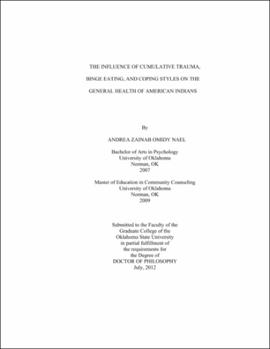| dc.contributor.advisor | Roman, John | |
| dc.contributor.author | Nael, Andrea Zainab Omidy | |
| dc.date.accessioned | 2013-11-26T08:33:25Z | |
| dc.date.available | 2013-11-26T08:33:25Z | |
| dc.date.issued | 2012-07 | |
| dc.identifier.uri | https://hdl.handle.net/11244/7261 | |
| dc.description.abstract | Scope and Method of Study: The purpose of this study was to investigate three possible factors that may be associated with poor mental and physical health within American Indian communities. Data were gathered from 302 American Indian adults living in the United States. Participants' style of coping, cumulative trauma history, and eating behaviors were explored in order to investigate the influence of these variables on current general mental and physical health. Multiple regression analyses were conducted to evaluate the relationships among the variables. Findings and Conclusions: Analysis revealed that cumulative trauma significantly accounted for 5.3% of the variance in general health (F (1, 290) = - 4.036, p < .001), 5.5% of the variance in mental health (F (1, 290) = - 4.090, p < .001) and 1.5% of the variance in physical health (F (1, 290) = - 2.103, p < .05). | |
| dc.description.abstract | Findings and Conclusions: Analysis revealed that the combined effect of cumulative trauma, coping styles, and binge eating significantly accounted for 16.4% of the variance in general health (F (5, 286) = 11.24, p < .001) and 40.3% of the variance in mental health (F (5, 286) = 38.61, p < .001) health. However, the set of variables did not significantly predict physical health. (Please refer to table 6-8). The prediction of general health by cumulative trauma produced a small effect size (r = .22). The prediction of mental health by cumulative trauma produced a medium effect size (r = .24). The prediction of physical health by cumulative trauma produced a small effect size (r = .14). The prediction of general health by cumulative trauma, binge eating and coping styles produced a large effect size (r = .40). The prediction of mental health by cumulative trauma, binge eating and coping styles produced a large effect size (r = .63). This study has provided evidence for the multifaceted and complex effects of repeated trauma exposure. Furthermore, evidence has been provided for the health disparities experiences by this population, and has further shown the predictive power of trauma exposure in predicting mental and physical illness. This study has provided evidence for the combined influence of coping styles, binge eating, and trauma exposure on general health, and particularly mental health. It is imperative that these finding be translated into services both in traditional health care setting as well as in mental health facilities. | |
| dc.format | application/pdf | |
| dc.language | en_US | |
| dc.rights | Copyright is held by the author who has granted the Oklahoma State University Library the non-exclusive right to share this material in its institutional repository. Contact Digital Library Services at lib-dls@okstate.edu or 405-744-9161 for the permission policy on the use, reproduction or distribution of this material. | |
| dc.title | Influence of cumulative trauma, binge eating, and coping styles on the general health of American Indians | |
| dc.contributor.committeeMember | Clark, Julie Dorton | |
| dc.contributor.committeeMember | Koch, Julie | |
| dc.contributor.committeeMember | Boswell, Don | |
| dc.contributor.committeeMember | Moses, L.G. | |
| osu.filename | Nael_okstate_0664D_12186.pdf | |
| osu.accesstype | Open Access | |
| dc.type.genre | Dissertation | |
| dc.type.material | Text | |
| dc.subject.keywords | american indian/native american | |
| dc.subject.keywords | binge eating | |
| dc.subject.keywords | coping | |
| dc.subject.keywords | health | |
| dc.subject.keywords | obesity | |
| dc.subject.keywords | trauma | |
| thesis.degree.discipline | Counseling Psychology | |
| thesis.degree.grantor | Oklahoma State University | |
